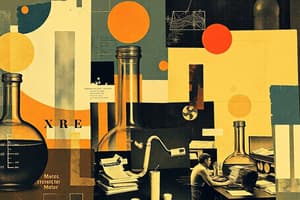Podcast
Questions and Answers
What are the three states of matter?
What are the three states of matter?
- Solid, Liquid, Gas (correct)
- Atom, Molecule, Particle
- Solid, Liquid, Plasma
- Element, Compound, Mixture
What is matter?
What is matter?
Anything that has mass and occupies space.
Which state of matter has a definite shape and volume?
Which state of matter has a definite shape and volume?
- Solid (correct)
- Liquid
- Gas
- None of the above
Which of the following describes the particles in a gas?
Which of the following describes the particles in a gas?
The process of a solid turning directly into a gas is called _____
The process of a solid turning directly into a gas is called _____
What is a pure substance?
What is a pure substance?
A compound can be separated into simpler substances through ordinary chemical means.
A compound can be separated into simpler substances through ordinary chemical means.
What is an element?
What is an element?
Which type of mixture has a uniform composition throughout?
Which type of mixture has a uniform composition throughout?
The change of a gas to a solid is known as _____
The change of a gas to a solid is known as _____
Match the following phase changes with their descriptions:
Match the following phase changes with their descriptions:
What does the Law of Definite Proportions state?
What does the Law of Definite Proportions state?
Study Notes
States of Matter
- Matter includes anything that has mass and occupies space, composed of atoms and molecules.
- Three primary states of matter: solids, liquids, and gases.
Properties of Solids
- Particles are closely packed, cannot be compressed, and have fixed shape.
- Molecular forces are strong, restricting particle movement to vibration.
Properties of Liquids
- Particles are close but not rigidly held, allowing for flow and movement past one another.
- Take the shape of their containers, with weaker molecular forces than solids.
- Exhibit vibration, rotation, and translation.
Properties of Gases
- Particles are randomly arranged and far apart, moving quickly in all directions.
- Easily compressed due to large distances between molecules and take the shape of their containers.
- Possess vibration, rotation, and translation.
Phase Changes of Matter
- Physical changes that do not affect chemical composition.
- Known as transition changes with examples including:
- Sublimation: Solid to gas
- Deposition: Gas to solid
- Vaporization: Liquid to gas
- Condensation: Gas to liquid
- Melting: Solid to liquid
- Freezing: Liquid to solid
Classification of Matter
- Pure Substance: Definite composition with fixed properties, can be an element or compound.
- Element: Simplest form of matter, composed of one type of atom; cannot be broken down by chemical means.
- Compound: Formed by the chemical combination of elements; can be separated chemically.
- Mixtures: Combinations of two or more substances in variable proportions, classified as:
- Homogeneous: Uniform composition
- Heterogeneous: Distinct components
Colloids and Specific Types
- Colloids consist of small particles suspended in a medium.
- Solid Aerosol: Solid dispersed through gas.
- Liquid Aerosol: Liquid dispersed in gas.
- Sol: Solid particles suspended in a liquid, characterized by small particle size.
- Solid Sol: A colloid formed when solid particles are suspended in another solid.
Laws and Principles
- Law of Definite Proportions: Any given compound contains fixed and constant proportions of its constituent elements.
Studying That Suits You
Use AI to generate personalized quizzes and flashcards to suit your learning preferences.
Related Documents
Description
Explore the different states of matter and their properties in this quiz. You'll learn about the unique degrees of freedom for solids, liquids, and gases, and how these relate to their molecular behavior. Test your understanding of chemistry fundamentals related to matter!




